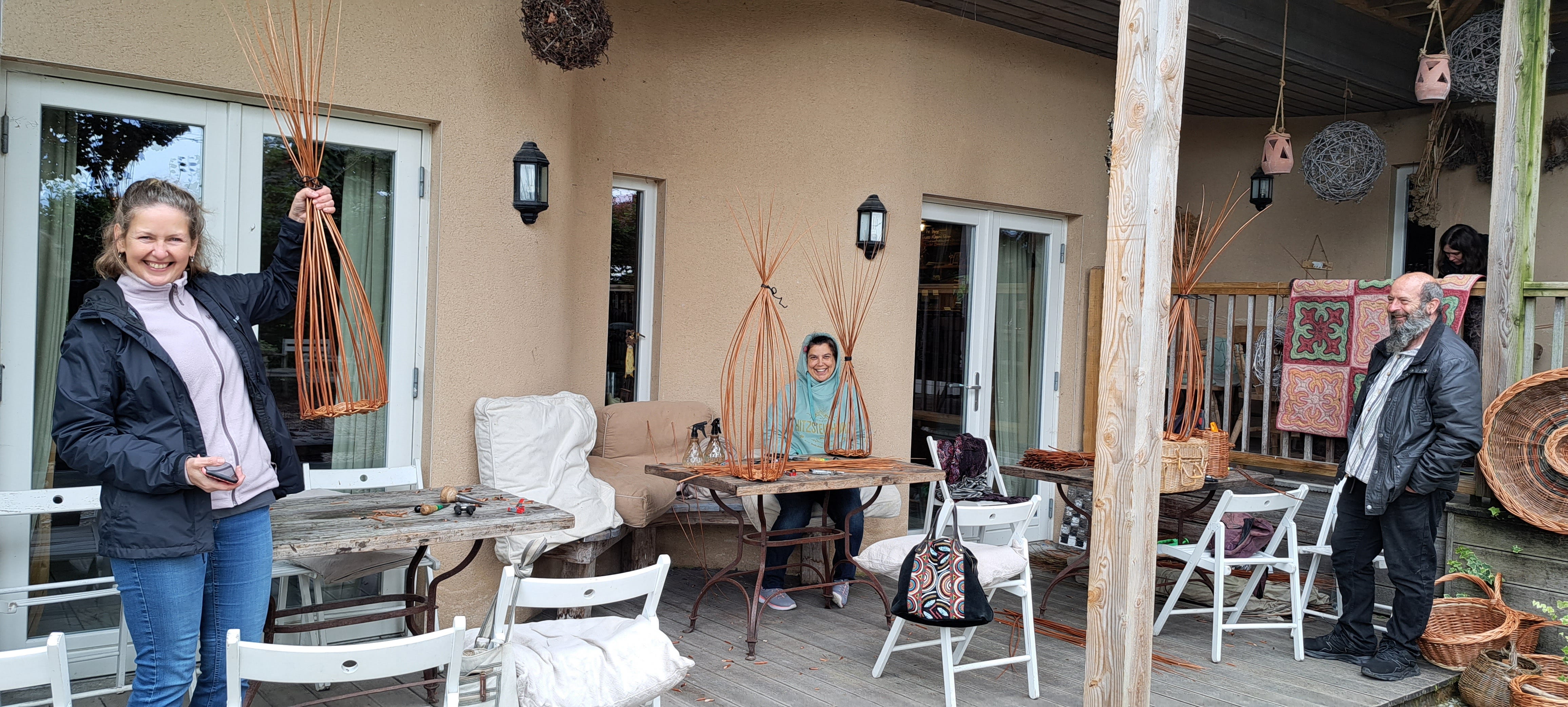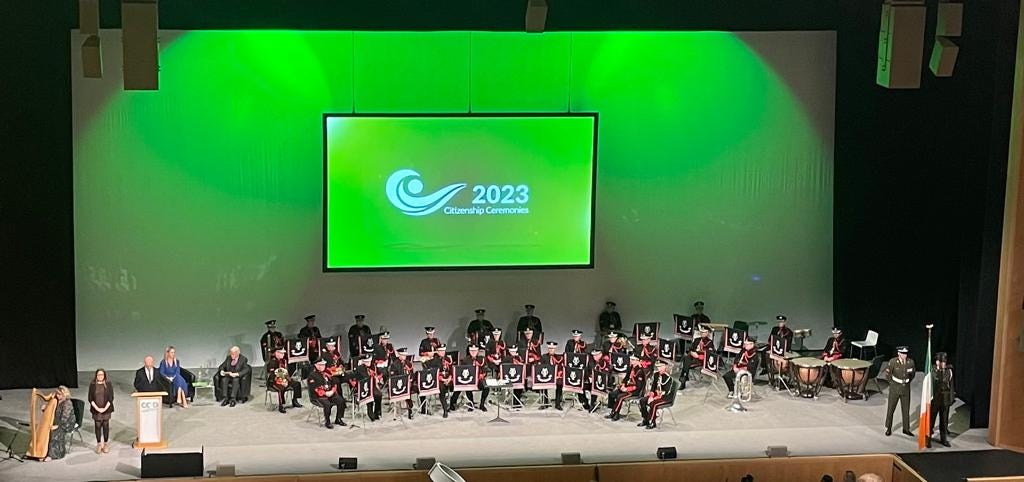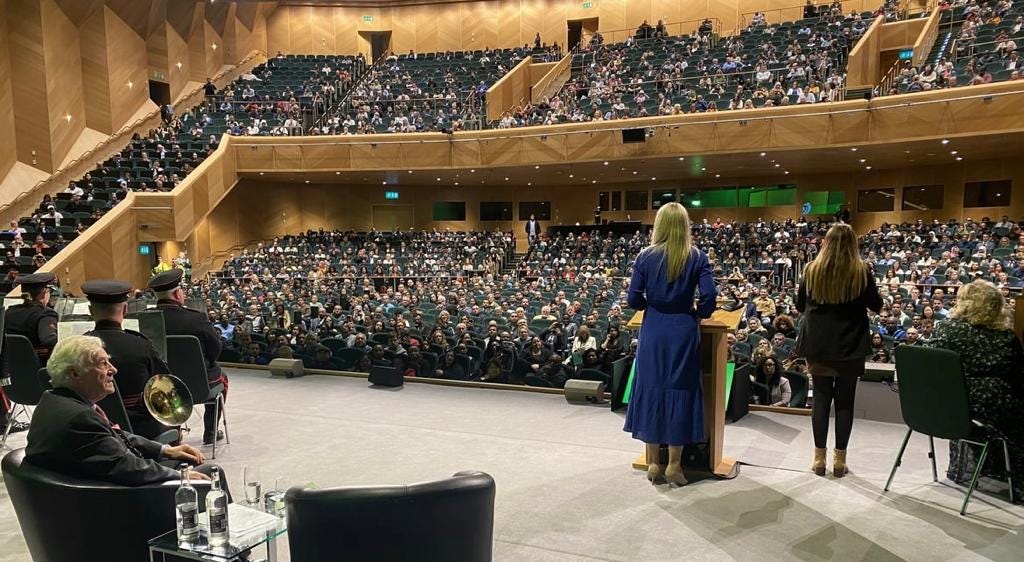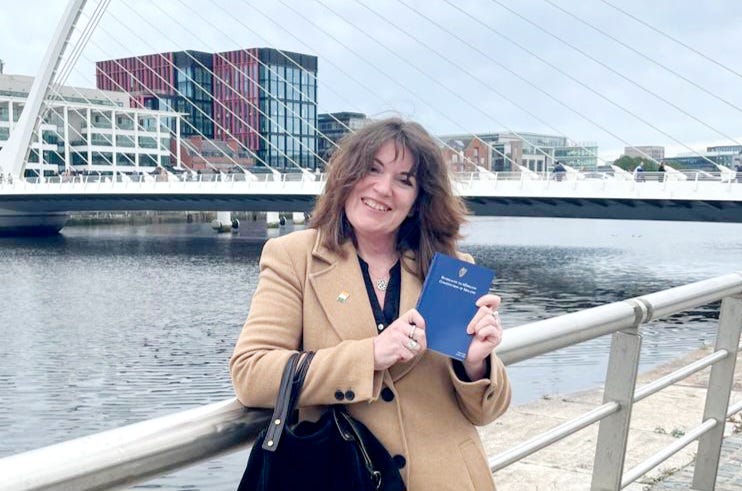This is not the post I was scheduled to write for October, but I am trying to listen to my intuition, and small events this week have stolen my attention and focussed it here, on the words I am about to write.

I am in pain today, the kind of pain that makes you sweat with the exertion of just accepting it, so I fear this body of work may come to you a little disjointed. This pain is a symptom of whatever it is that is inside me as I transition into my H A G years, an unspecified ‘something’ that was discovered last December, that needs a closer look, that put me on the gynaecological ‘urgent’ list, that still has not been seen to. Although I celebrate my H A G years, I feel as though my age has moved me beyond importance in terms of accessing health care; I no longer bear the promise of fecundity displayed in the bloom of youthful sexuality and my useful years of child-bearing and rearing are long since over. There’s no rush, therefore, to ‘fix’ me. It feels like rejection.
Tomorrow, I will wend my way across the country to Dublin for a special ceremony in which I confirm my allegiance to this land of Ireland, and in which the state accepts me as one of its own. A daughter of Ireland. I already know now that tomorrow I will weep. I thought it was just a formality, a practicality that provides me the same passport as the rest of my family, a logical step which follows a life and a family made here. It has surprised me to realise that it means far more to me than that. And so I will cry when this gift is bestowed upon me tomorrow. I don’t speak the language, I wasn’t born here, but I am officially and legally recognised and acknowledged as belonging here. Demonstrations of acceptance are not something I am accustomed to. It seems to say that what I am, who I am, is enough, and I have never felt that before.
So here are Rejection and Acceptance in juxtaposition in my life, jostling against each other, waging a war in my consciousness. So much of my life in recent years has felt like a waiting game controlled by others: my job, my book, my health, my citizenship, important strands of my living this life held in the hands of others, strangers whose responsibility is lodged in the bigger picture, not in the happiness of one individual. How to take control of that? How to decide that I am more worthy than someone else? As a woman pushing sixty, if it comes to it, I will always defer to the younger person who has all the messy joy and pain of life ahead of them. But what about me? If I don’t value my own worth, why would anyone else?
Here’s another acceptance by the state: my role as unpaid carer. My daughter, Carys, needs 24-7 full-time care. I give it freely out of love, which is just as well, as there is no alternative. Next July, Carys will be leaving school, and there appears to be no daycare adequate to her needs. Even if there is, there is fierce competition for spaces. I need to be healthy and strong to step into this role, but there appears to be a reluctance to support my health and so enable me. The interconnectedness of things seems beyond the grasp of certain state functions.
In the absence of national, rational joined-up thinking and forward planning, and the inner turmoil this creates, I turn, as always, to the Cailleach for support.


WISDOMS
1.
[T]o be indigenous is to protect life on earth. By honouring the knowledge in the land, and caring for its keepers, we start to become indigenous to place.
— Robin Wall Kimmerer, author, scientist, professor, member of Citizen Potawatomi Nation
In the week that I am adopted as an Irish citizen, I also read “In the Footsteps of Nanabozho: Becoming Indigenous to Place”, a chapter in Kimmerer’s book, Braiding Sweetgrass. It is coincidental; it was simply where I was at in the reading of the text, but I am astounded at just how intensely her words mirror my own development, and not for the first time. So perhaps it isn’t coincidental at all. This week has been a sliding scale of steep ups and downs, of juxtapositions, of life and deaths, and this chapter brought me to tears for the umpteenth time in a handful of days.
In my book, I describe how sometimes I feel stretched so thin that I am in danger of snapping. With imposter syndrome settling in and weighing me down with doubts, such as ‘you’ll never be truly Irish, and everyone knows it’, ‘learning a nation’s history does not make you Irish’, ‘the Irish language is a part of Irish identity that you’ll never achieve’, ‘having an Irish great-grandfather does not make you Irish’, etc ad nauseum, I was feeling particularly fragile and vulnerable to my own internal punishment, even as I celebrated my joy.
But Kimmerer reminded me of a time, many years ago, when I was driving through the flatlands of central Ireland, on a day when summer sunshine pierced the clouds and lit up the green of the landscape so vibrantly against an unusually deep blue sky, and for the first time I felt the uncanny, a wordless knowing that I belonged in place, that this place called Ireland was also my place. I had walked across its hills and valleys and felt accepted by the landscape. It was a weird thought to have had back then, but it moved me, and flooded me with gratitude. And I never forgot that. It was, I think, an epiphany of sorts.
But Kimmerer also points out the problematic language we use when we talk about identity: she writes, “[i]mmigrants cannot by definition be indigenous. Indigenous is a birth-right word. No amount of time or caring changes history or substitutes for soul-deep fusion with the land.” Which brings me back to square one, to imposter Ali, pretending to be something she is not. Kimmerer, as she always does, turns to the plants as teachers to puzzle through this conundrum. I understand this; wild plants are often my teachers, too. She writes about the common Plantain, a plant immigrant that followed the White Man’s Footsteps across the land; it did not threaten native species as so many non-native plants do, as colonialism does, but quietly co-existed with them, establishing itself as a healing force for all, offering its gifts freely to all who have need of them. It became integrated, not indigenous, but naturalised. 1
And now my adoption into this nation begins to make sense; I have also been naturalised, and in return, although no demand is made from me, I must, like the plantain, be a good neighbour and offer my gifts and meet my responsibilities. The past and where our origins lie still matter, but so does the future - my children’s future, and the future of all my descendants whom I will never know, but whom I have brought to this place. And of course, now more than ever, so does the land upon which all our futures depend.
And this is where my naturalisation began: walking the land, meeting the past in the landscape, meeting the history which accompanies archaeological relics left behind in the landscape by peoples long gone, meeting the plants, learning their names and properties, learning to recognise the calls of birds, allowing the patch of land I live upon to repopulate itself with native plants, free from chemicals and the heavy hand of man. I realise that what I am doing is preserving a small part of the past and the present for the future, and sharing my learning and experiences as I go. Perhaps caring for the land in this way is how I meet my responsibility as a mother, and new daughter of Ireland; perhaps it is also my gift.
2.
[T]he capacity to care is the thing which gives life its deepest significance.
— Pablo Casals, cellist, composer, conductor
I mentioned ‘caring’ in the previous paragraph. We use the word ‘care’ without thinking too much about what it means, as if it is some abstract terminology that describes how we want others to see us: we ‘care’ about climate change, we ‘care’ about equality, we ‘care’ about refugees. But care is not an adjective; it’s a verb, much like the word ‘love’. Caring is doing. If you care about climate change, what are you doing about it?
As a mother, I learned that caring for my children takes time, effort and constant giving. It is work. When Carys was born to me, caring took on a whole new level. Her survival depends on the care I give. Without the care provided by a carer, she could not live. So when I say I care, I quite literally mean it; care is something I do. And so do we all, as parents, as children, as pet-owners. Some of us care for our gardens. Some of us make caring our careers. We care for the things which touch our own lives, and it gives our lives meaning. It brings us fulfilment, which in turn creates joy and feelings of wellbeing… we all feel good after doing a ‘good deed’, right? Caring is a win-win; both the carer and the receiver benefit.
I care for my loved ones, which is right and proper, but it needs to be put into context. My caring for them is pointless if I don’t care for the environment and community where they live. I don’t want them eking out a difficult life in a land and society which has effectively become a desert. So doing my bit to care for the land, the community, and the nation which is our home becomes vitally important. As always, everything is interlinked. We can’t have one without the other. And when caring moves beyond the personal sphere into the wider realm of society and landscape and politics, I vote not for my own benefit, but for that of my children and their children, and that means asking them what is important to them, not what I perceive it to be. After all, I won’t be here. The giving of care to others and to the land is the greatest gift we can give.
3.
We don't need a melting pot in this country, folks. We need a salad bowl. In a salad bowl, you put in the different things. You want the vegetables - the lettuce, the cucumbers, the onions, the green peppers - to maintain their identity. You appreciate differences.
— Jane Elliot, diversity educator, public speaker
This was something addressed by Helen McEntee, Minister for Justice, in her speech to us as new Irish citizens at our citizenship ceremony. Well, not salad, exactly! But she explained that becoming Irish did not require us to give up our origins, our culture, our stories, but to share them, to add them into the pot, to weave them into the fabric of what it means to be part of the Irish nation.
It was what I needed to hear; Ireland as a new nation, barely a century old, is so confident of its heritage, its culture and its future that, unlike the common message we hear about immigrants from elsewhere around this globe, it does not feel threatened by difference, but welcomes and values it. Listening to these words was one of many moments when my emotions spilled over.
No country is perfect, and Ireland still has much work to do. But it’s steering a promising course. And now I am part of it.
4.
We live in a society that wants to label you with a color, sexuality, religion, or ethnicity. It divides us, but it also allows us to find pride in our identity.
— Logan Browning, actor
The concept of nationhood can be a source of pride and a rallying call. But it can also be divisive. Nowhere are we more aware of this than in Ireland. But think also of Ukraine, fighting for its right to be independent from a Russia which seeks to dominate and absorb it. Israel has declared war on Palestine; Azerbaijan has invaded Armenia… the world is exploding into conflict around us. National identity often seems to pit peoples against each other. Much like religion.
What can we do, when all of this is so out of our control? Some mornings, I can hardly get out of bed for worrying about what is happening in the world. But that achieves nothing.
So I go back to what I can do to make life meaningful for myself and those around me. I educate myself and discuss what I learn with my sons and friends. I donate what and when I can to causes which support those who are suffering. I use my buying power, choosing to spend what I have with conscientious companies that demonstrate they operate under fair and inclusive, eco-friendly policies. I have not ruled out peaceful protest when it is required.
My actions are not changing the world, but they are actions nonetheless, and they prevent me from feeling so helpless, whilst also, I hope, doing some good. I am grateful to have experienced peace throughout my lifetime so far, but recent happenings prove that it is not to be taken for granted.
5.
You must not lose faith in humanity. Humanity is an ocean; if a few drops of the ocean are dirty, the ocean does not become dirty.
— Mahatma Gandhi
If there is one thing I’ve learned from the time I have spent with the land and its plant inhabitants, it is that this earth is resilient despite all we have done to her.
Humanity in general is deeply flawed and seems fixed on self-destruction, but in real life, I meet so many beautiful people who care for this planet and all that lives on it. They form a quiet movement for a different way of living, they are making it a reality, and I believe it is growing.
We move through strange and difficult times, yet I am convinced that caring for the land as powerfully as we care for each other will enable us to prevail.
Lessons on the ‘stimulus of compensatory growth’
Ten days have passed since I started writing this newsletter. I apologise for the delay. I have withdrawn for a while, as I sometimes need to do, finding calm within my four walls, venturing out only to spend time with my non-human neighbours. The little patch of yarrow is still blooming. The dogwood, willow and snowberry are holding onto their leaves. The cows drift across their fields, chewing, chewing, and gazing at me with their deep, placid eyes; be in the moment, they seem to say, there is only now, the grass, the sky… At the front of my house, the song thrushes gather. Their playful antics look for all the world like bird-flirting. Bees are droning lazily in the ivy. It is so warm and mild, nature seems somehow slightly out of sync with its usual pattern; October here is typically cold. I return to my weaving, but the willow is reluctant and does not co-operate. I give up.
I think of the willow, and I think of Kimmerer. The willow came here to me of its own accord. Normally, we would cut it back each autumn, and it responds by growing ever more abundant and vigorous. I have not tended to it for quite some time, and my little patch of land is in need of re-balancing. Kimmerer reminds us of the need for reciprocity, that the plants will tend to us if we attend to them; that nature often benefits from the intervention of humankind because we are ‘part of the system’, part of the landscape too. Harvesting sustainably respects the plant, respects the gift the plant gives. Taking too much is harmful, but not taking enough can also have detrimental effects; this is what she means when she talks of the Honourable Harvest.
In taking on this patch of land, I must meet my responsibilities as a good neighbour to the plants I share this space with. I am the newcomer, the immigrant here, this land is theirs but I have been accepted and welcomed; they are reminding me I must play my part. Willow has a long relationship with humankind going back many centuries; its versatility as a building material, for weaving, as a good source of firewood and charcoal, not to mention its medicinal use due to the presence of salicylic acid in its bark, ensured its success. Perhaps the willow, like Kimmerer’s sweetgrass, fares better with the human touch.
In just a few weeks, I will have completed my first year learning from the Cailleach. I feel I have become quite a different person. I have come to know myself better, and come to know myself as a part of this landscape. During this year, it feels as though the land has accepted me, and the nation has accepted me; the only person who still has trouble accepting me, is me. There is still so much to learn, but I’m getting there.
I realise now that for a long time, I was existing in a state of not belonging, that I was permanently in transition, neither English or Irish. It was a prolonged transition, trapped in a liminal state of being, unable to let go of who I was and move into who I am becoming. As I embrace my new identity, I turn to the Cailleach. The lessons from last winter are still vivid; I welcome this winter into my life, and look forward to all it has to offer.
Now that I’m ready for it, though, winter doesn’t seem to be in much of a hurry to get here! Such is life…
Citizenship Ceremony 2023


As I took my seat, this is what the band were playing. I wasn’t expecting a band to be playing music for us, and it was so lovely, I welled up… I knew there were going to be tears, but not before the ceremony had even started © Ali Isaac.


Kimmerer, Robin Wall. Braiding Sweetgrass, Penguin Random House UK, 2020.





Aw, Ali. Congratulations! I was very moved by your post. My take-away: the land called you. End of story. You belong to the land. xx
Hi Ali - as someone who has moved from Ireland to Canada (40 years and citizenship after 18 years there) and now back again to Ireland, I’m familiar with that insider/outsider feeling. But there’s real strength in it. You see things that insider/insiders don’t and can appreciate the strangeness, beauty and wonder of Ireland, even as you feel the frustrations of its overly-bureaucratic processes and lack of care for many people. You are making a difference for all of us here, and in the end, that’s the best any of us can hope to do. Naturalised plants are those that fit comfortably in their new surrounding and add to rather than take from biodiversity.